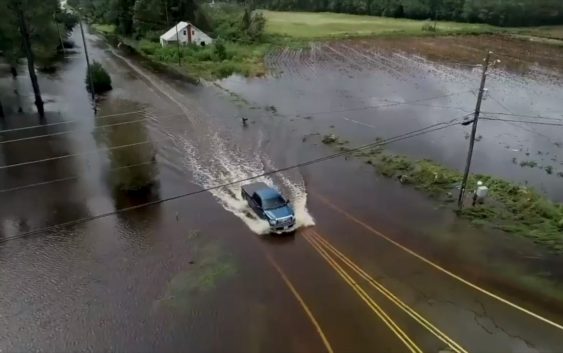- One set of evacuation orders lifted in Caldwell County after wildfire contained
- 'We gutted every building' | Chimney Rock rebuilding after Hurricane Helene
- 'We gutted every building' | Chimney Rock rebuilding after Hurricane Helene
- Debris from Hurricane Helene provides fuel, complicates containment for spring wildfires
- David & Nicole Tepper increase Hurricane Helene relief commitment to $750k
We can’t let hurricane damage hold back rural NC

Most North Carolinians have experienced the stress of hurricane season, whether it’s a direct or indirect hit, or luckily ends up simply being a threat; these storms are ingrained in the experiences of generations of the state’s residents. Being a North Carolinian also means that we help our communities recover from these storms, requiring grit and a sense of community that is unique and heartfelt. I have called North Carolina home for 24 years and certainly have my share of stories to contribute — witnessing the power of nature and the ability to recover.
The past two years have tested our grit and resilience. In October 2016, Hurricane Matthew hit with unprecedented flooding and destruction. Only two years later, Hurricane Florence similarly damaged eastern communities – many of the same communities for a second time – also with historic flooding. The economic havoc of Matthew still was reverberating when Florence hit, with over one billion dollars in agricultural loss alone.
North Carolinians have long responded aggressively and decisively in the wake of such storms, and these latest storms are no exception. The state is prioritizing helping those most in need by taking steps to aid the hardest-hit communities.
And for the second time in recent years, the governor and General Assembly have tapped the Golden LEAF Foundation, charged with investing tobacco settlement agreement dollars back into North Carolina’s rural and economically distressed communities, to distribute major portions of the state’s recovery assistance.
Digital Access for only $0.99
For the most comprehensive local coverage, subscribe today.
#ReadLocal
The foundation is responsible for administering three components of storm relief and recovery from two legislative appropriations following the storms and a separate Hurricane Florence relief fund. The relief fund, called the NC Disaster Relief Fund, was created after Hurricane Floyd in 1999 and reactivated by Gov. Roy Cooper again this year following Florence.
The two disaster recovery programs, one for Matthew and one for Florence, will help local governments and nonprofit business lenders fill the gaps needed to speed recovery when other sources of assistance are not available or not sufficient. The disaster relief program targets nonprofits or local governments providing more immediate assistance, such as food and short-term home repair for households.
Private individuals and companies have given generously to this fund, and we are proud to partner with the United Way of North Carolina and the Governor’s Office to carry out that charity.
The three pieces of hurricane recovery and relief aim to work swiftly and efficiently to relieve immediate and long-term challenges. We’ve awarded tens of millions in assistance, and are on target to move quickly with funds we have left. Early reports show that the grants are having an effect.
One of the Matthew recovery grants helped rebuild the Lenoir County Cooperative Extension Office, which flooded during Hurricane Matthew. The property was elevated before the rebuild, keeping it dry during Hurricane Florence.
Another grant in Bladen County helped keep its water supply clean and flowing during Hurricane Florence, a major problem during the earlier storm, by funding four new generators that were strategically placed throughout the county.
Despite the misfortune of the past two years, it remains critical that natural disasters don’t also become economic disasters, especially in the hardest hit communities in Eastern North Carolina. Our role is a small part of the overall effort to assist these communities and Golden LEAF is honored to be entrusted by our state’s leadership to help with relief and recovery. Our website www.goldenleaf.org has information on the grants we have awarded in this area.
We are committed to doing what it takes to fulfill our mission: to help build economic transformation and opportunity in rural communities. Providing adequate recovery during this region’s greatest time of need is crucial.
Dan Gerlach is president of the Golden LEAF Foundation.